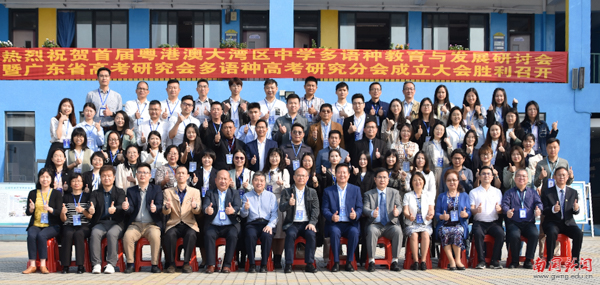Vice President Wang Mingyu elected president of Foreign Languages Examination Research Division of Guangdong University Entrance Examination Research Association
From March 11 to 12, Guangdong University Entrance Examination Reseach Association(the GUEERA) held the first conference on Foreign Languages Education and Development for Secondary Schools in the Great Bay Area and the inaugural meeting of its Division of Foreign Languages Examination Research at Guangzhou Development Zone Foreign Language School. The conference was aimed to promote the development of foreign languages as subjects of learning in secondary schools in Guangdong Province and to enhance the links between universities and secondary schools in the field of foreign language education. Vice President Wang Mingyu was invited to attend the conference and elected president of the GUEERA’s Foreign Languages Examination Research Division.

At the conference, Wang Mingyu and Prof. Guo Weisong, chairman of Guangdong University Entrance Examination Research Association, jointly inaugurated the Foreign Languages Examination Research Division of Guangdong University Entrance Examination Research Association. Afterwards, Wang Mingyu, as the president of the Division, presented the appointment letters to the first leadership team members of the Division.
Wang Mingyu delivered a keynote speech entitled “Curriculum Reform: Always on the Way” in which he introduced the history of China's curriculum reform of primary and secondary education based on his years of experience as a front-liner in education and teaching management. He elaborated on the importance of curriculum reform and development for school prospects, teacher development and student growth with both theoretical perspectives and practical cases.
At the sub-forum for foreign languages teachers, Li Yang from the Department of Russian language of SCBC’s School of European Languages and Cultures gave a speech on the “implication of College Russian language education for secondary school Russian language teaching” in which he analyzed the situation of Russian language teaching in secondary schools and the current problems. Based on the teaching methods of College Russian language, he suggested several ways to help secondary school students understand and consolidate important and difficult points, including building online Russian teaching resources, expanding the situational space of classroom learning, changing teaching methods to a context-based, task-driven, or/and Russian-English contrastive thinking. Moreover, an innovative teaching model with online courses should be built on the basis of the “Internet +” platform which can inspire in students a cultural awareness to language learning and thus lead students to a scientific understanding of learning a foreign language.